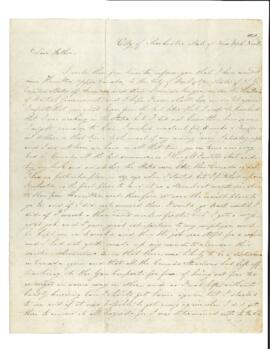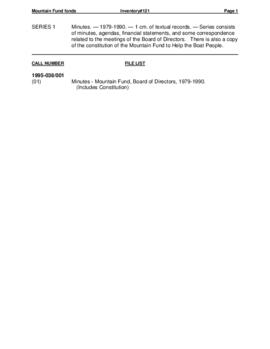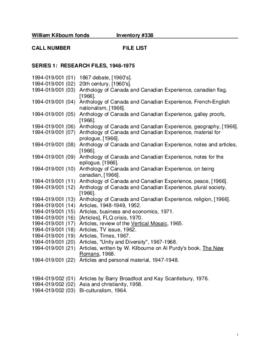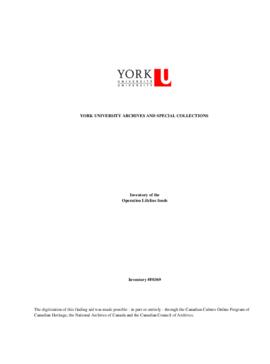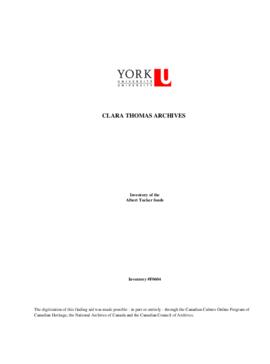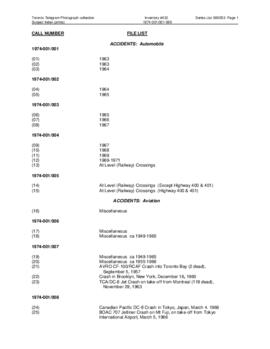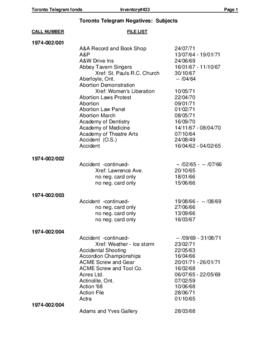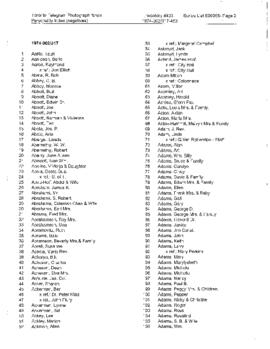File consists of a handwritten letter written from a brother and sister to their father in Kent, England, describing their decision to leave Hamilton, Upper Canada, due to unrest in the colony and to escape British tyranny, and to move to Rochester in the state of New York.
Fonds consists of records of the Mountain Fund pertaining to its activities, helping Vietnamese refugees in coming to Hamilton, Ontario. The fonds includes minutes of the Board of Directors, correspondence, financial records, publications and photographic materials.
Mountain Fund (Hamilton, Ont.)The fonds consists of William Kilbourn's records pertaining to his activities as scholar and researcher, and as alderman in the City of Toronto. The fonds includes his correspondence, research and subject files, his City Hall files, personal files, and manuscripts for "The Firebrand: William Lyon Mackenzie and the Rebellion in Upper Canada".
Kilbourn, WilliamThe fonds documents the establishment of Operation Lifeline - Campaign to Save the Boat People and its activities for the period of 1978-1985.
Operation LifelineFonds consists of research notes and historical documents related to the creation of an official history of the John Labatt Brewing Company of Canada.
Tucker, AlbertSeries consists of approximately 466, 500 photographic prints created or accumulated by staff at the Toronto Telegram. The largest volume of prints are under the subjects "United States" (ca. 7.2 metres of prints), "Ships) (ca. 5 metres), "England" (ca. 4 metres) and "Canada" (ca. 3.6 metres). Certain subjects have been arranged outside the general subject organization of the prints such as "Personalities" (15 metres); "Personalities/politicians" (ca. 4 metres); "Armed forces personnel" (ca. 8 metres) largely of the World War II era, provably used in reports of missing/wounded/killed in action. As well, there are photographs of groups of servicemen, again largely World War II era. Finally, there is a group of photographs of personalities who were associated with the Toronto Telegram, predominantly from the period after Bassett bought the newspaper (post 1952). The series also includes many photographic images purchased from wire services for the purposes of illustrating national and international stories.
Toronto TelegramSeries consists of approximately 833,500 photographic negatives, the majority of which are black and white 35mm.
The negatives are arranged by subject heading, although there are more subject headings here than in the print series, and tend to be local in nature. Negatives for photographs of personalities have been separated out of the main arrangement.
Series consists of negatives of individuals or groups, arranged alphabetically by last name. Negatives of Toronto Telegram staff are grouped alphabetically at the end of the series.
Toronto TelegramThe series consists of scrapbooks, newspaper clippings, and printed materials. The scrapbooks are of three types. The first is a collection of large scrapbooks, approximately 220 in total, that consist of copies of the 'Telegram', and its predecessor, the 'Evening Telegram'. These scrapbooks are divided into several categories of material: advertising and promotion; circulation and carriers; clubs; contests; events; daily & weekly features, such as 'Schooner Days' by C.H.J. Snider; general clippings; news features (that include articles on royal visits); outdoor activities; photo albums on personalities such as royalty and politicians; sports; theatre & opera; and feature columns and programs run by the Globe & Mail and the Toronto Star.
The second group is a collection of scrapbooks of editorials and contests of the Toronto Telegram and its rivals, the Toronto star and the Toronto Globe and Mail. The scrapbooks consist of Toronto Telegram editorials, 1962-1967; Globe and Mail editorials, 1961 1970; and Toronto Star editorials, 1940 1968. There are also indexes to Star editorials, scrapbooks concerning the Star Santa Claus Fund, 1923 1960, and the Star Fresh Air Fund.
Finally, there are two moderate sized collections of scrapbooks. The first consists of four books, covering the Toronto Transit Commission, 1950 1970. The second covers the canals of the St. Lawrence River for the period 1910 1939.
The newspaper clippings are divided into two broad areas: personalities and subjects. These consist of clippings from the 'Telegram,' arranged alphabetically by personality name, including such people as Winston Churchill, Henry Ford, Mitchell Hepburn, and Nellie McClung; and subjects ranging from abortion to medicine and from Australia to Japan. Both groups of files are complete only to the letter 'M'.
The printed material consists of accompanying material removed from the files of photoprints in the 1987-001 accession. It contains information about the subjects of the photos they were separated from and are cross referenced with those print files.
The finding aids available for this series consist of a contents list for the scrapbooks; a box list for the newspaper clippings, indicating the range of topics or names within each box; and a file list for the printed material.
Toronto Telegram